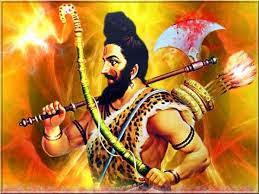Mangalore(Tulunadu)is a parashurama shristi
Mangalore possesses a rich historical past. Mangaluru(Mangalore) which is bounded by the Arabian sea and the western ghats is Parashurama’s shristi and named after the goddess mangaladevi
It is believed that Parashurama, the sixth avathar of Vishnu, destroyed the Kshatriya kings and donated the land to sage Kashyapa. As he believed, staying in the land which he donated is not right. He made in-depth remorse of the past conduct and meditation of Lord Shiva on Sahyadri mountrain region looking for new land for him to take refuge. Lord Shiva moved by his prayers, appeared before him and said he will incarnate in the form of Lord Manjunatha for the benefit of mankind and asked him to meditate upon him at Kadalivana (which is now Kadri).
When Parashurama took a look at Kadalivana which was far from Sahyadri mountain, it seemed to be ocupied by the ocean. Parashurama will approach the ocean king, requesting him to leave the Kadalivana for which Ocean king denies. Angry on the ocean king, Parashurama takes his axe, and roars on Ocean king. Ocean king frigtened on the Parashurama’s actions, steps back leaving behind the land for Parashurama. This is how Parashurama gets his shleter and this is the shisti of Mangalore, which is the city of goddess Mangaladevi.
Mangalore has different names for the city in different languages/communities of Mangalore. In Tulu, it’s called Kudla or Tulunadu, in Konkani, Mangalore is referred to as Kodial. Muslims/Beary refer to the city as Maikala,in Kannada they call it as Mangaluru and the Pandyan King Chettian, who called the city Mangalapuram, the Keralites refer to Mangalore as Mangalapuram. Also, in the 14th Century the Arabian traveler Ibn Battuta referred to Mangalore as Manjarur in his stories.



Nice
ReplyDeleteGreat. Nice blog.
ReplyDeleteTrue story
ReplyDeleteVaidika mathada janoklena valase/spread n Parashurama Srishti nd Saankethika vaad panpune maatra. Ayitha artha Tulunad Parashurama na srishti ath. Parasurama g dumbula Tulunad ithund. India ithund.
ReplyDelete